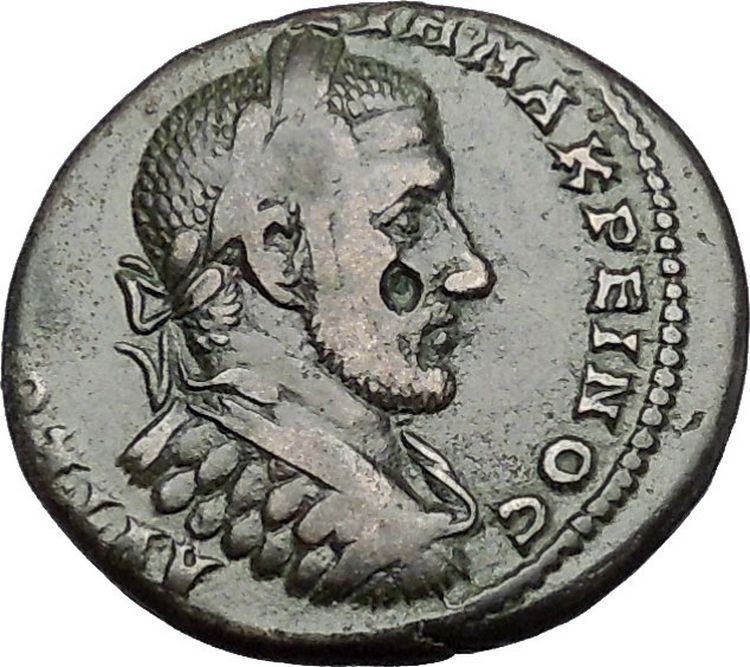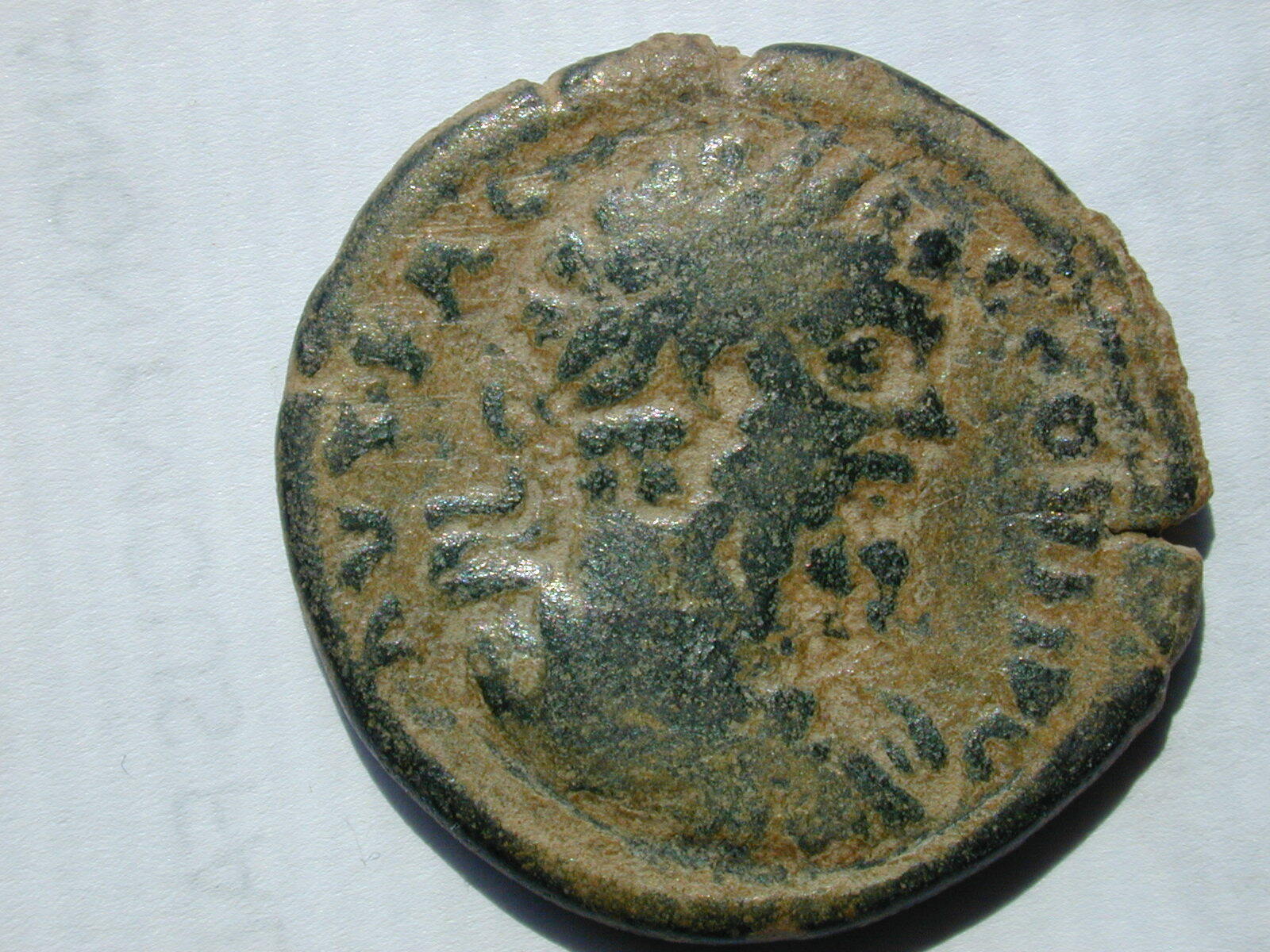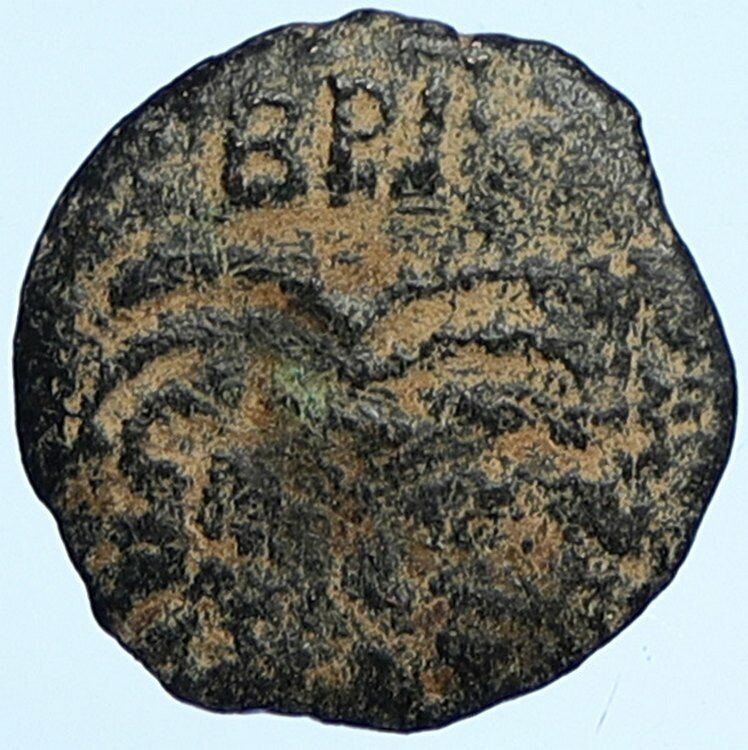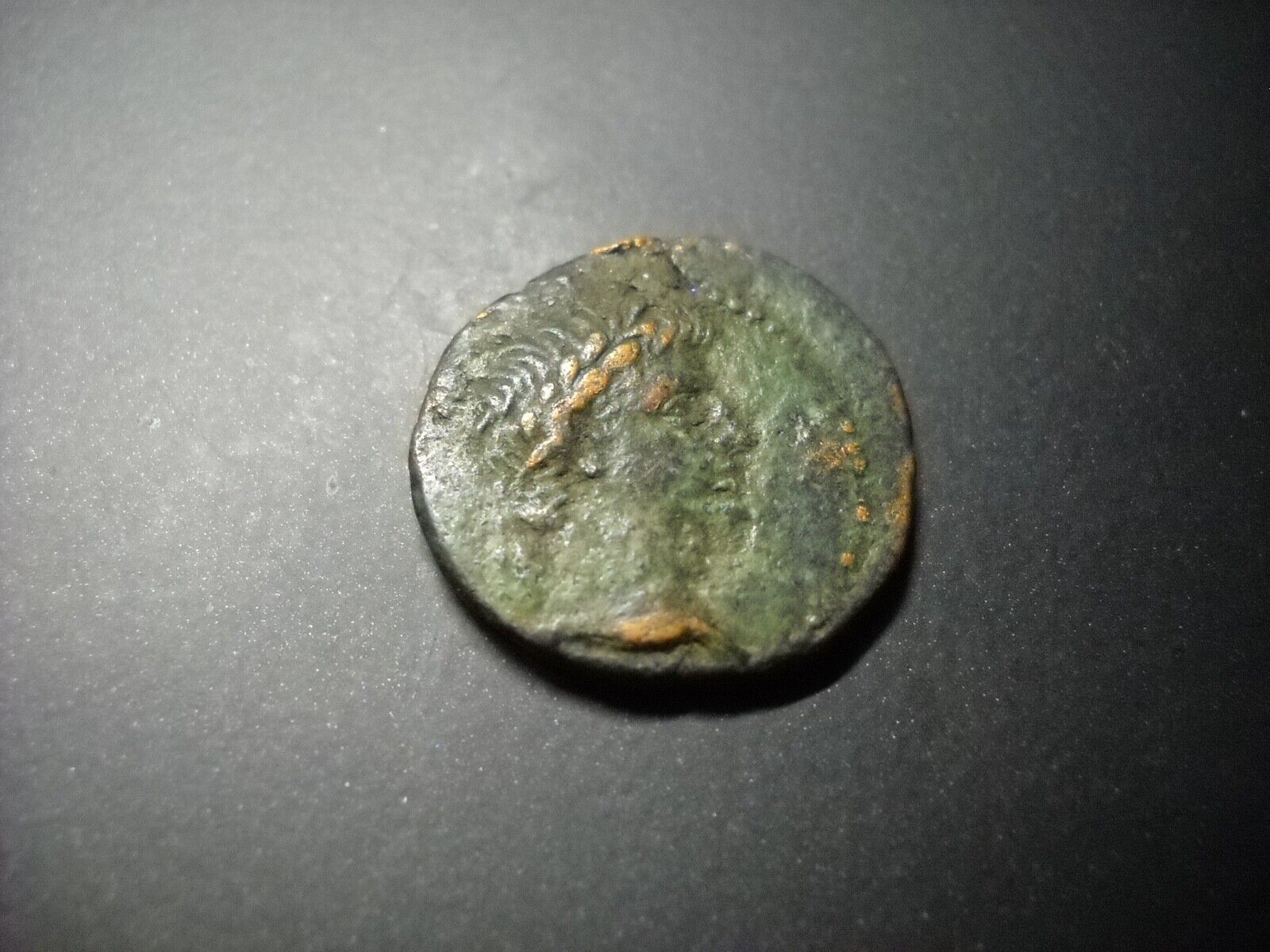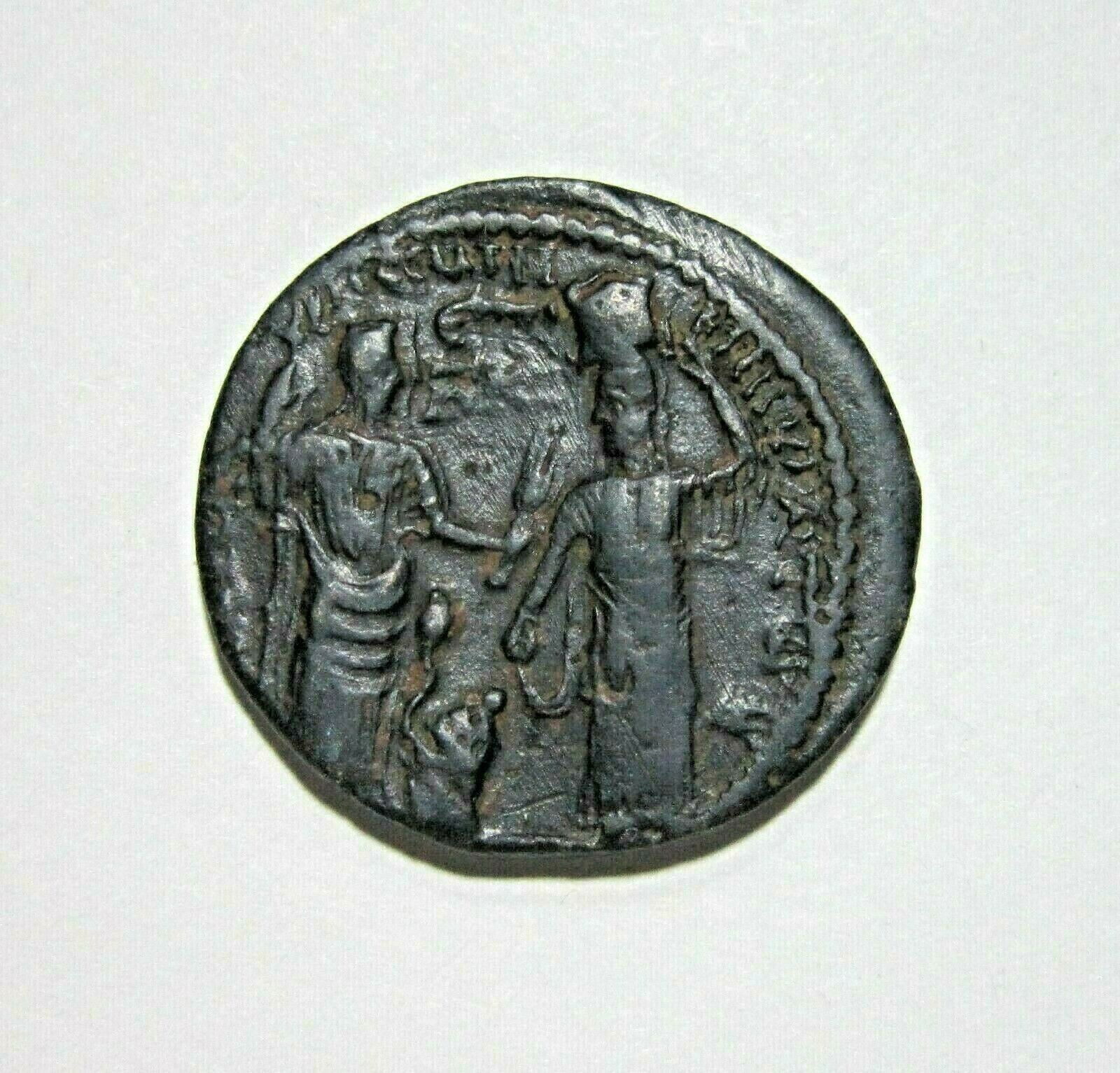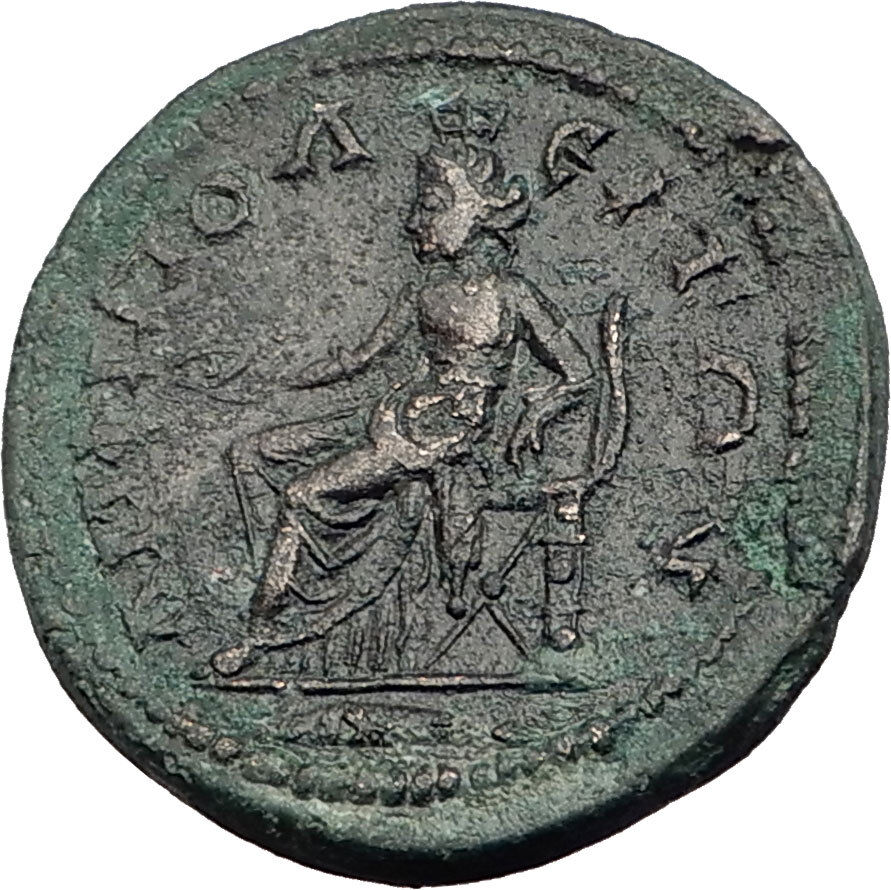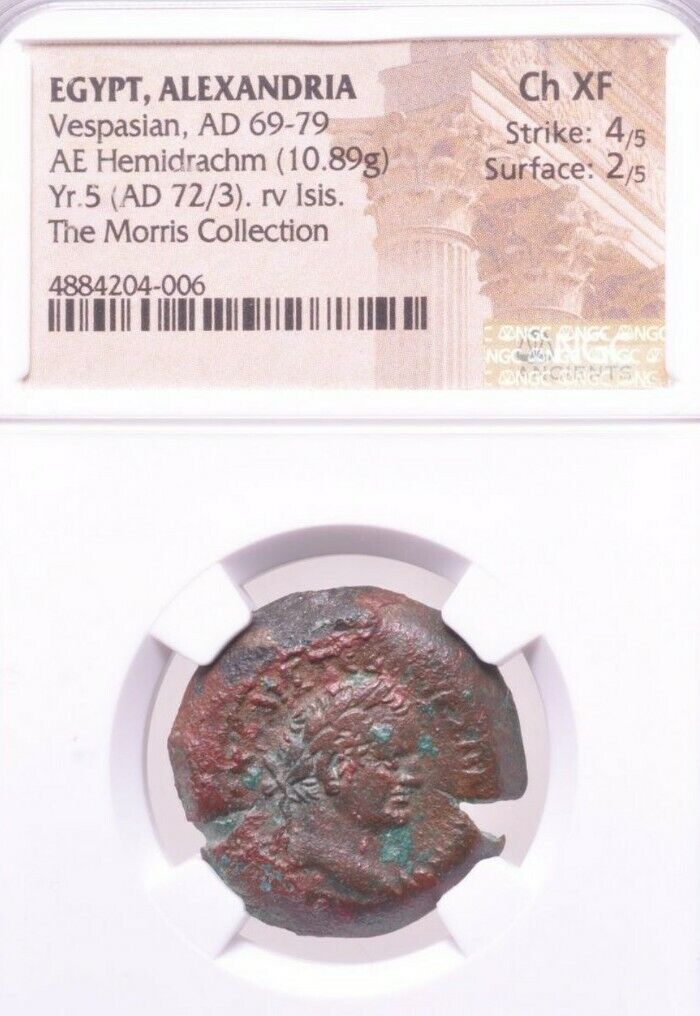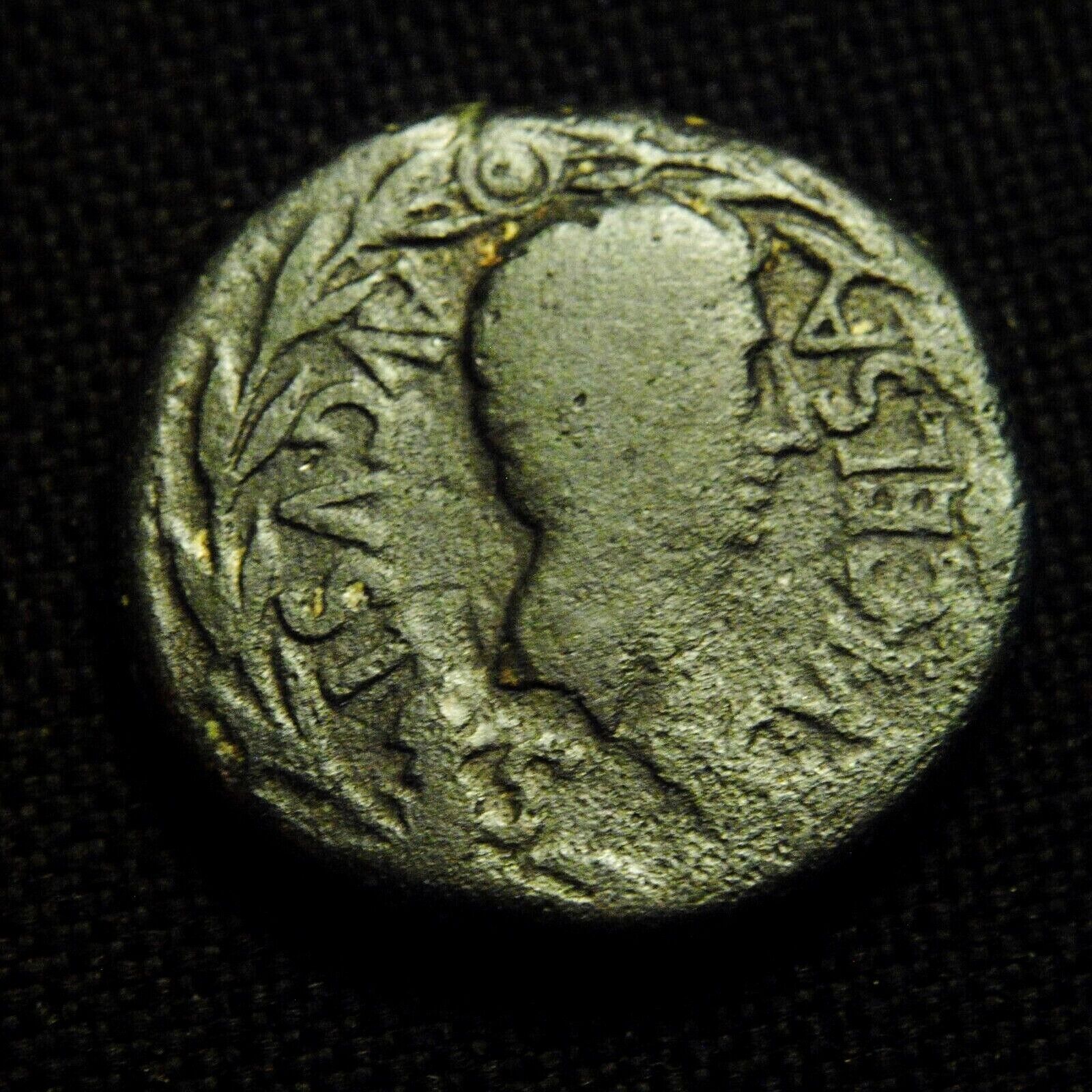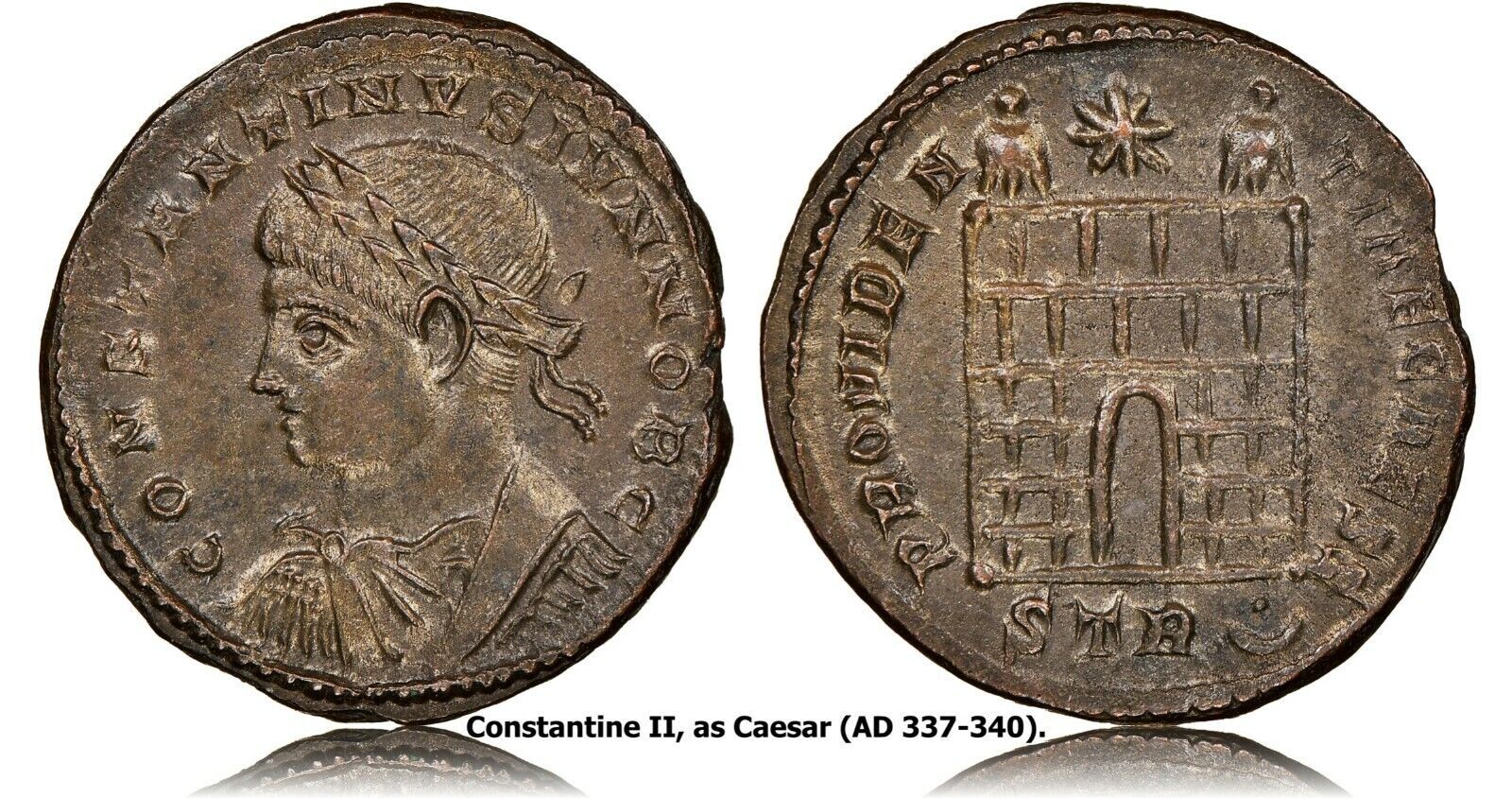-40%
MACRINUS 217AD Marcianopolis TYCHE Luck Goddess Ancient Roman Coin i50972
$ 132
- Description
- Size Guide
Description
Item:i50972
Authentic Ancient Coin of:
Macrinus
-
Roman Emperor
: 217-218 A.D. -
Bronze 27mm (9..01 grams) of
<="" font="" face="Times New Roman" color="#000000"> Marcianopolis in Moesia Inferior under Legate Furius Pontianus
MAKPEINOC, Laureate, draped and cuirassed bust right, seen from behind.
VΠ ΠONTIANOV MAPKIANOPOΛEITΩN, Tyche standing left, holding rudder and cornucopia.
You are bidding on the exact item pictured, provided with a Certificate of Authenticity and Lifetime Guarantee of Authenticity.
Tyche (Greek for luck; the Roman equivalent was
Fortuna
) was the presiding
tutelary deity
that governed the fortune and prosperity of a city, its destiny. Increasingly during the Hellenistic period, cities had their own specific iconic version of Tyche, wearing a
mural crown
(a crown like the walls of the city).
The Greek historian
Polybius
believed that when no cause can be discovered to events such as floods, droughts, frosts or even in politics, then the cause of these events may be fairly attributed to Tyche.
Stylianos Spyridakis concisely expressed Tyche's appeal in a Hellenistic world of arbitrary violence and unmeaning reverses: "In the turbulent years of the
Epigoni of Alexander
, an awareness of the instability of human affairs led people to believe that Tyche, the blind mistress of Fortune, governed mankind with an inconstancy which explained the vicissitudes of the time."
In literature, she might be given various genealogies, as a daughter of
Hermes
and
Aphrodite
, or considered as one of the
Oceanids
, daughters of
Oceanus
and
Tethys
, or of
Zeus
. She was connected with
Nemesis
and
Agathos Daimon
("good spirit").
She was uniquely venerated at
Itanos
in Crete, as
Tyche Protogeneia
, linked with the Athenian
Protogeneia
("firstborn"), daughter of
Erechtheus
, whose self-sacrifice saved the city.
She had temples at
Caesarea Maritima
,
Antioch
,
Alexandria
and
Constantinople
. In
Alexandria
the
Tychaeon
, the temple of Tyche, was described by
Libanius
as one of the most magnificent of the entire Hellenistic world.
Tyche appears on many
coins
of the Hellenistic period in the three centuries before the Christian era, especially from cities in the Aegean. Unpredictable turns of fortune drive the complicated plotlines of
Hellenistic romances
, such as
Leucippe and Clitophon
or
Daphnis and Chloe
. She experienced a resurgence in another era of uneasy change, the final days of publicly sanctioned
Paganism
, between the late-fourth-century emperors
Julian
and
Theodosius I
who definitively closed the temples. The effectiveness of her capricious power even achieved respectability in philosophical circles during that generation, though among poets it was a commonplace to revile her for a fickle harlot.
In
medieval art
, she was depicted as carrying a
cornucopia
, an
emblematic
ship's rudder, and the
wheel of fortune
, or she may stand on the wheel, presiding over the entire circle of fate.
The constellation of
Virgo
is sometimes identified as the heavenly figure of Tyche, as well as other goddesses such as
Demeter
and
Astraea
.
Marcianopolis
, or
Marcianople
was an ancient Roman city in
Thracia
. It was located at the site of modern day
Devnya
,
Bulgaria
.
The city was so renamed by Emperor
Trajan
after his sister
Ulpia Marciana
, and was previously known as Parthenopolis. Romans repulsed a
Gothic
attack to this town in
267
(or
268
), during the reign of
Gallienus
.
Diocletian
made it the capital of the
Moesia Secunda
province.
Valens
made it his winter quarters in 368 and succeeding years, Emperor
Justinian I
restored and fortified it. In 587, it was sacked by the king of the
Avars
but at once retaken by the Romans. The Roman army quartered there in 596 before crossing the Danube to assault the Avars.
Between 893 and 972 it was one of the most important medieval cities in south-eastern Europe.
Marcus Opellius Macrinus
(ca. 165 - June 218) was
Roman
emperor
for fourteen months in 217 and 218. Macrinus was the first emperor to become so without membership in the senatorial class. Macrinus was possibly of
Berber
descent.
//
Background and career
Born in Caesarea (modern
Cherchell
, Algeria) in the
Roman province
of
Mauretania
to an
equestrian
family, Macrinus received an education which allowed him to ascend to the Roman political class. Over the years he earned a reputation as a skilled lawyer. Under the emperor
Septimius Severus
he became an important bureaucrat. Severus' successor
Caracalla
appointed him
prefect
of the
Praetorian guard
. While Macrinus likely enjoyed the trust of Caracalla, this may have changed when, according to tradition, he was prophesied to depose and succeed the emperor. Rumors spread regarding Macrinus' alleged desire to take the throne for himself. Given Caracalla's tendency towards murdering political opponents, Macrinus probably feared for his own safety should the emperor become aware of this prophecy. According to Dio, Caracalla had already taken the step of re-assigning members of Macrinus' staff.
In the spring of 217, Caracalla was in the eastern provinces preparing a campaign against the
Parthian Empire
. Macrinus was among his staff, as were other members of the praetorian guard. In April, the emperor went to visit a temple of
Luna
near the spot of the
battle of Carrhae
, accompanied only by his personal bodyguard, which included Macrinus. Events are not clear, but it is certain that Caracalla was murdered at some point on the trip (perhaps on
April 8
). Caracalla's body was brought back from the temple by his bodyguards, along with the corpse of a fellow bodyguard. The story as told by Macrinus was that the dead guard had killed Caracalla. By
April 11
, Macrinus proclaimed himself emperor. Macrinus also nominated his son
Diadumenianus
Caesar
and successor and conferred upon him the name "Antoninus", thus connecting him with the relatively stable reigns of the
Antonine emperors
of the 2nd century.
Reign (April 217 - June 218)
Despite his equestrian background, Macrinus was confirmed in his new role by the
Senate
. According to S.N. Miller, this may have been due to both his background as an accomplished jurist and his deferential treatment of the senatorial class. He found it necessary, however, to replace several provincial governors with men of his own choosing. Caracalla's mother
Julia Domna
was initially left in peace, but when she started to conspire with the military he ordered her to leave
Antioch
. Being at that time in an advanced stage of breast cancer (Cassius Dio) she chose instead to starve herself to death.
In urgent matters of foreign policy, Macrinus displayed a tendency towards conciliation and a reluctance to engage in military conflict. He averted trouble in the province of
Dacia
by returning hostages that had been held by Caracalla, and he ended troubles in
Armenia
by granting that country's throne to
Tiridates
, whose father had also been imprisoned under Caracalla. Less easily managed was the problem of
Mesopotamia
, which had been invaded by the
Parthians
in the wake of Caracalla's demise. Meeting the Parthians in battle during the summer of 217, Macrinus achieved a
costly draw
near the town of
Nisibis
and as a result was forced to enter negotiations through which was obliged to pay the enormous
indemnity
of 200 million sesterces to the Parthian ruler
Artabanus IV
in return for peace.
Macrinus' reluctance to engage in warfare, and his failure to gain victory over even a historically inferior enemy such as the Parthians caused considerable resentment among the soldiers. This was compounded by the rolling back of the privileges they had enjoyed under Caracalla and the introduction of a pay system by which recruits received less than veterans. After only a short while, the legions were searching for a rival emperor.
At a high point of his popularity monuments were built to revere Macrinus. The grand
tetrastyle
Capitoline Temple
, in
Volubilis
was erected to honour Emperor Macrinus in 217 AD.
His popularity also suffered in Rome. Not only had the new emperor failed to visit the city after taking power, but a late-summer thunderstorm caused widespread fires and flooding, and Macrinus' appointee as urban prefect proved unable to repair the damage to the satisfaction of the populace and had to be replaced.
Downfall
This discontent was fostered by the surviving members of the
Severan dynasty
, headed by
Julia Maesa
(Caracalla's aunt) and her daughters
Julia Soaemias
and
Julia Mamaea
. Having been evicted from the imperial palace and ordered to return home by Macrinus, the Severan women plotted from their home near
Emesa
in
Syria
to place another Severan on the imperial throne. They used their hereditary influence over the cult of
sun-deity
Elagabalus (the Latinised form of
El-Gabal
) to proclaim Soaemias' son
Elagabalus
(named for his family's patron deity) as the true successor to Caracalla. The rumor was spread, with the assistance of the Severan women, that Elagabalus was in fact Caracalla's illegitimate son, and thus the child of a union between first cousins.
On
May 18
, Elagabalus was proclaimed emperor by the
Gallica
Legio III
at its camp at
Raphana
. A force under his tutor Gannys marched on
Antioch
and engaged a force under Macrinus on
June 8
,
218
. Macrinus, deserted by most of his soldiers, was soundly defeated in the
battle
, and fled towards Italy disguised as a courier. He was captured near
Chalcedon
and later executed in
Cappadocia
. His son Diadumenianus, sent for safety to the Parthian court, was captured at
Zeugma
and also put to death.
Macrinus' short reign, while important for its historical "firsts", was cut short due to the inability of this otherwise accomplished man to control or satisfy the soldiery. In his death at the hands of Roman soldiers, Macrinus reinforced the notion of the soldiers as the true brokers of power in the third-century empire and highlighted the importance of maintaining the support of this vital faction. His reign was followed by another seventeen years of rule under the Severan emperors
Elagabalus
and
Severus Alexander
.
="">
Frequently Asked Questions
How long until my order is shipped?:
Depending on the volume of sales, it may take up to 5 business days for shipment of your order after the receipt of payment.
How will I know when the order was shipped?:
After your order has shipped, you will be left positive feedback, and that date should be used as a basis of estimating an arrival date.
After you shipped the order, how long will the mail take?
USPS First Class mail takes about 3-5 business days to arrive in the U.S., international shipping times cannot be estimated as they vary from country to country. I am not responsible for any USPS delivery delays, especially for an international package.
What is a certificate of authenticity and what guarantees do you give that the item is authentic?
Each of the items sold here, is provided with a Certificate of Authenticity, and a Lifetime Guarantee of Authenticity, issued by a world-renowned numismatic and antique expert that has identified over 10000 ancient coins and has provided them with the same guarantee. You will be quite happy with what you get with the COA; a professional presentation of the coin, with all of the relevant information and a picture of the coin you saw in the listing.
Compared to other certification companies, the certificate of authenticity is a -50 value. So buy a coin today and own a piece of history, guaranteed.
Is there a money back guarantee?
I offer a 30 day unconditional money back guarantee. I stand behind my coins and would be willing to exchange your order for either store credit towards other coins, or refund, minus shipping expenses, within 30 days from the receipt of your order. My goal is to have the returning customers for a lifetime, and I am so sure in my coins, their authenticity, numismatic value and beauty, I can offer such a guarantee.
Is there a number I can call you with questions about my order?
You can contact me directly via ask seller a question and request my telephone number, or go to my About Me Page to get my contact information only in regards to items purchased on eBay.
When should I leave feedback?
Once you receive your order, please leave a positive. Please don't leave any negative feedbacks, as it happens many times that people rush to leave feedback before letting sufficient time for the order to arrive. Also, if you sent an email, make sure to check for my reply in your messages before claiming that you didn't receive a response. The matter of fact is that any issues can be resolved, as reputation is most important to me. My goal is to provide superior products and quality of service.
